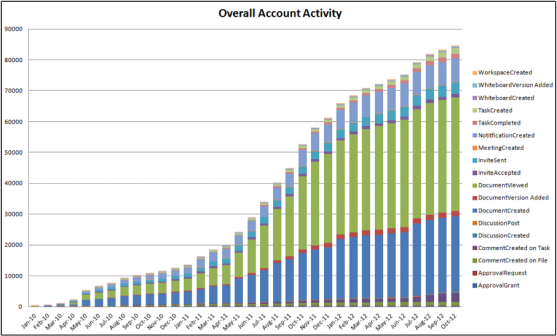 As Huddle is a sponsor of CloudBeat, we asked their customer AKQA contribute a relevant article. This post is written by Robert Burns, Executive IT Director, AKQA.
As Huddle is a sponsor of CloudBeat, we asked their customer AKQA contribute a relevant article. This post is written by Robert Burns, Executive IT Director, AKQA.
About three years ago, AKQA was facing a challenge: with 900 employees and thousands of external clients and partners scattered around the world, working on hundreds of major advertising and marketing campaigns, we needed a way to effectively manage information and projects.
(Want to learn more about AKQA’s cloud strategy? The company will be onstage at VentureBeat’s CloudBeat 2012 conference, later this week in Redwood Shores, Calif. Register for CloudBeat today and come check out this and many other compelling enterprise case studies.)
Managing business content and enabling secure file-sharing and collaboration isn’t typically easy, especially as companies grow into hundreds or thousands of employees. In fact, it’s rather problematic. You’re faced with the task of keeping track of business information, ensuring there are no data leaks, while empowering workers to share and collaborate on information with each other and external parties.
Typically all information sharing—from files to discussions, ideas and tasks—is accomplished through an endless stream of emails. Some organizations also turn to legacy technologies, shared drives and VPNs. This makes life difficult for the IT department as information is locked within the organization’s four walls and external access has to be granted to people outside of the firewall.
It would be easy to say that the cloud is the solution to all the problems associated with legacy technologies. The cloud is infinitely more scalable; requires fewer capital expenses; enables both internal and external collaboration and provides a platform for anywhere, anytime access. But the truth is, the cloud can only achieve these things when it’s leveraged in conjunction with mature platform that guarantees the things that have made the traditional model great (e.g., security, reliability and control) are not lost.
The big question was how do we ensure our employees can share information and collaborate without sacrificing security and compliance?
Huddle provided AKQA with a solution to effectively manage content and facilitate secure collaboration across the firewall for thousands of users.
Since deploying Huddle in January of 2010, usage of Huddle within AKQA has grown rapidly, now exceeding 1,100 users. With Huddle, internal global teams share information and collaborate with clients around the world, including Delta, Gap, Nike, Verizon Wireless, Xbox.

Using Huddle, all material relating to client campaigns can be stored in a central workspace that can be easily accessed by the planning, creative, technology, media and analytics teams, regardless of their physical location. These teams can also manage their relationships with key suppliers, to ensure the efficient delivery of the end product and present work to their clients. As a result, all constituents have full visibility of all collateral, content, discussions and tasks relating to their account or campaign—without the need to email anything back and forth or use any other project management tools, social networking tools, VPNs or shared drives.
From an IT perspective, Huddle scales easily without placing extra pressure on IT resources. Perhaps more importantly, Huddle is secure and reliable. It has been awarded the ISO 27001 certification and offers a great deal of IT control, allowing granular security and permissions protocols. The company offers a money-back guarantee if uptime falls below 99.9% (it’s consistently above 99.995%) and makes its uptime publicly available.
On the topic of reliability: AKQA, like many businesses, was affected by the tragedy of Hurricane Sandy. Natural disasters are often among the last things IT managers consider—until it’s too late. In our case, because our content was stored in Huddle, users around the world were able to access and continue working, even though onsite datacenters were temporarily unavailable during the power outage.
Cloud-based platforms like Huddle have been built from the ground up to align the needs of enterprise IT departments with the needs of end users, whose content-rich, collaborative workflows are redefining the fabric of modern business. As the rate at which workers create and consume content continues to increase, it’s important for businesses to understand how their IT infrastructure—and specifically the cloud services they choose—can facilitate more productive working, rather than inhibit it.
 Since 2005, Robert Burns has managed the information technology and data infrastructure ecosystem for AKQA, a global interactive marketing agency with over 1,200 employees. Responsible for all aspects of IT and datacenter operations across several global locations, Robert provides long-term strategy, roadmaps, and leadership to the IT organization ensuring it aligns with company objectives and creates business value.
Since 2005, Robert Burns has managed the information technology and data infrastructure ecosystem for AKQA, a global interactive marketing agency with over 1,200 employees. Responsible for all aspects of IT and datacenter operations across several global locations, Robert provides long-term strategy, roadmaps, and leadership to the IT organization ensuring it aligns with company objectives and creates business value.


